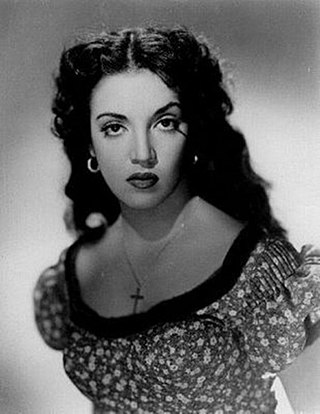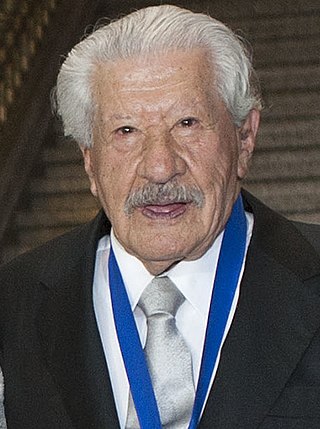Luis Mandoki | |
|---|---|
 Mandoki in 2016 | |
| Born | August 17, 1954 Mexico City, Mexico |
| Occupation(s) | Director, producer, screenwriter |
| Years active | 1975–present |
Luis Mandoki (born August 17, 1954) is a Mexican film director, working in Mexico and Hollywood.
Luis Mandoki | |
|---|---|
 Mandoki in 2016 | |
| Born | August 17, 1954 Mexico City, Mexico |
| Occupation(s) | Director, producer, screenwriter |
| Years active | 1975–present |
Luis Mandoki (born August 17, 1954) is a Mexican film director, working in Mexico and Hollywood.
Luis Mandoki was born on August 17, 1954 in Mexico City. [1] His parents are Hungarian Jews. [2] He studied Fine Arts in Mexico, and at the San Francisco Art Institute, the London College of Printing and the London International Film School. While attending this last institution, he directed his first short film Silent Music which won an award at the International Amateur Film Festival of Cannes Film Festival in 1976.
Back in Mexico, he directed short films and documentaries for the Instituto Nacional Indigenista (the National Institute for the Indigenous), Conacine (National Commission of Film) and the Centro de Produccion de Cortometraje (Center for the Production of Short Films). He received an Ariel Award of the Mexican Academy of Film for his short film El secreto in 1980. His film Motel was selected to represent Mexico in film festivals around the globe in 1984.
At the age of 30, he developed, wrote, produced and directed Gaby: A True Story (1987), a movie about the struggles of disability activist Gaby Brimer. [1] [2] This film was nominated for both the Academy and Golden Globe Awards.
For the next 15 years, he filmed only in English until the critically acclaimed Voces inocentes of 2004. This film gave him a Best Director nomination for the Ariel Award in 2005. The film also received three awards and was nominated for Best Film. The film was selected to represent Mexico for the Academy Award for Best Foreign Language Film and had a box-office output of 49.4 million pesos (roughly 4.5 million U.S. dollars) and was seen by 1.5 million people.
Mandoki resides in Mexico City with his wife, Olivia, and three children Camille, Daniel and Michelle.

María Cristina Estela Marcela Jurado García, known professionally as Katy Jurado, was a Mexican actress.

Mexican cinema dates to the late nineteenth century during the rule of President Porfirio Díaz. Seeing a demonstration of short films in 1896, Díaz immediately saw the importance of documenting his presidency in order to present an ideal image of it. With the outbreak of the Mexican Revolution in 1910, Mexican and foreign makers of silent films seized the opportunity to document its leaders and events. From 1915 onward, Mexican cinema focused on narrative film.

Voces Inocentes is a 2004 war drama film directed by Luis Mandoki. The plot is set during the Salvadoran Civil War, and is based on writer Óscar Torres's childhood. The film serves as a general commentary on the military use of children. The movie also shows injustice against innocent people who are forced to fight in the war. It follows the story of the narrator, a boy named Chava.
The XLVII Award of the Premio Ariel (2005) of the Academia Mexicana de Artes y Ciencias Cinematográficas took place on March 29 of 2005 at the Palacio de Bellas Artes. The Premio Ariel for the best movie was awarded to Temporada de patos.
My Brother's Wife is a 2005 Mexican film directed by Ricardo de Montreuil, based on the novel of the same name by the Peruvian writer, journalist and TV host Jaime Bayly. It starred Bárbara Mori, Manolo Cardona, Christian Meier, and Angélica Aragón.

Alejandro "Álex" de la Iglesia Mendoza is a Spanish film director, screenwriter, producer and former comic book artist.

Ariel López Padilla is a Mexican actor. He is best known for his acting in many telenovelas such as Gata Salvaje, Pecados Ajenos, Inocente de ti. Ariel Lopez works for most famous telenovelas productions principally for Telemundo and Venevision, but also has some credits in Televisa and TV Azteca. He lives in Miami, U.S.

María Elena Enríquez Ruiz, known as Helena Rojo, was a Mexican actress and model.

Nuevo Cine Mexicano, also referred to as New Mexican Cinema is a Mexican film movement started in the early 1990s. Filmmakers, critics, and scholars consider Nuevo Cine Mexicano a "rebirth" of Mexican cinema because of the production of higher-quality films. This rebirth led to high international praise as well as box-office success, unseen since the golden age of Mexican cinema of the 1930s to 1960s. The quality of Mexican films suffered in the decades following the golden age due in part to Mexican audiences watching more overseas films, especially Hollywood productions. This resulted in the rise of Mexican genres such as Luchador films, sexicomedias and ultimately the low-budget direct-to-video Mexploitation film.

Ignacio López Tarso was a Mexican actor of stage, film and television. He acted in about 50 films and appeared in documentaries and in one short feature. In 1973 he was given the Ariel Award for Best Actor for Rosa Blanca, and the Ariel de Oro lifetime achievement award in 2007. He was honored multiple times at the TVyNovelas Awards. At the time of his death, along with Armando Silvestre, he was the oldest living actor and one of the last surviving stars from the Golden Age of Mexican cinema.

Joaquín Cosío Osuna is a Mexican actor and poet. He has been nominated four times for the Mexican Academy of Film Ariel Awards, winning the Ariel Award for Best Supporting Actor for his work as Gabriel in The Thin Yellow Line in 2016.

Elizabeth Ann Sheridan Scarbrough, better known as Beatriz Sheridan was a Mexican actress and director. A pioneer of the Mexican telenovelas and prominent figure of the Mexican theater of the 20th century, she was also a teacher of dramatic technique for television and directed many great dramatic stars.

Gaby: A True Story is a 1987 biographical drama film directed by Luis Mandoki. An international co-production of the United States and Mexico, it stars Rachel Chagall, Norma Aleandro, Liv Ullmann, and Robert Loggia. Written by Michael Love and Martín Salinas, the film chronicles the lives of Gabriela Brimmer, a Mexican writer and disability rights activist, and her caretaker, Florencia Sánchez Morales.

Carmelita González was a Mexican lead actress known for her film roles during the Golden Age of Mexican cinema. She appeared in nearly 100 Mexican films during her career, opposite such actors as Mario Moreno Cantinflas, Pedro Infante and Jorge Negrete. González began her career by earning $21 but went on to win an Ariel Award for Best Supporting Actress for her 1984 performance in Luis Mandoki's Motel.
Michael James Love is an American screenwriter, producer, and film director. Love has written many screenplays, including Mavericks for Playtone, for Icon and Universal Studios, and Tina Modotti for Mick Jagger's Jagged Films and Warner Brothers.

The 55th annual Berlin International Film Festival was held from February 10–20, 2005. Man to Man by Régis Wargnier served as opening night film. The festival closed with Kinsey by Bill Condon.

Issa López is a Mexican director, writer and producer. Twelve Spanish language features have been produced from her scripts, four of them directed by herself. She has won several literary awards, including the National Novel Award granted by Mexico's Institute of Fine Arts and Literature in 2007.
Florencia Sánchez Morales (1923–2018) was a Mexican woman known for being the caretaker of writer and activist Gabriela Brimmer.
Sebastián Matías Aguirre Boëda is a Mexican actor. Son of musicians, Aguirre began acting as a child with a screen debut in the short films ¡Volar! and La Canción de los Niños Muertos (2008). His breakthrough performance was as Julián "Sacramento" Santos in Obediencia Perfecta (2014) in which he played a victim of sexual abuse by a priest, earning an Ariel Award for Breakthrough Male Performance. He subsequently appeared in another film, Güeros (2014), for which he also received another Ariel nomination, and the thriller Un Monstruo de Mil Cabezas (2015), portraying a teenager helping his mother to convince an insurance company to provide a treatment for her husband. Aguirre also is featured in the films Herederos.La vida inmoral de la pareja ideal (2016), directed by Manolo Caro.

The 60th Ariel Awards ceremony, organized by the Mexican Academy of Film Arts and Sciences (AMACC) took place on June 5, 2018, at the Palacio de Bellas Artes in Mexico City. During the ceremony, AMACC presented the Ariel Award in 26 categories honoring films released in 2017. The ceremony was televised in Mexico by Canal 22.